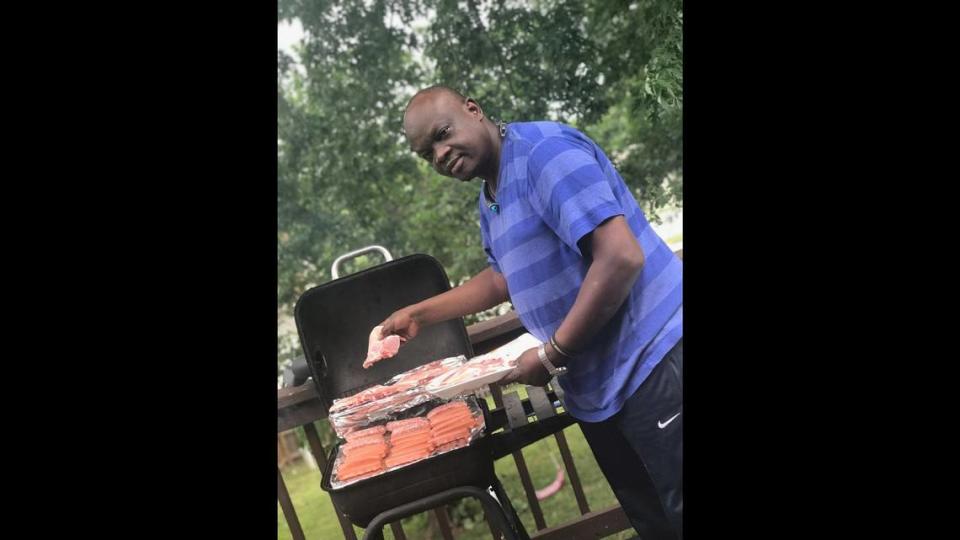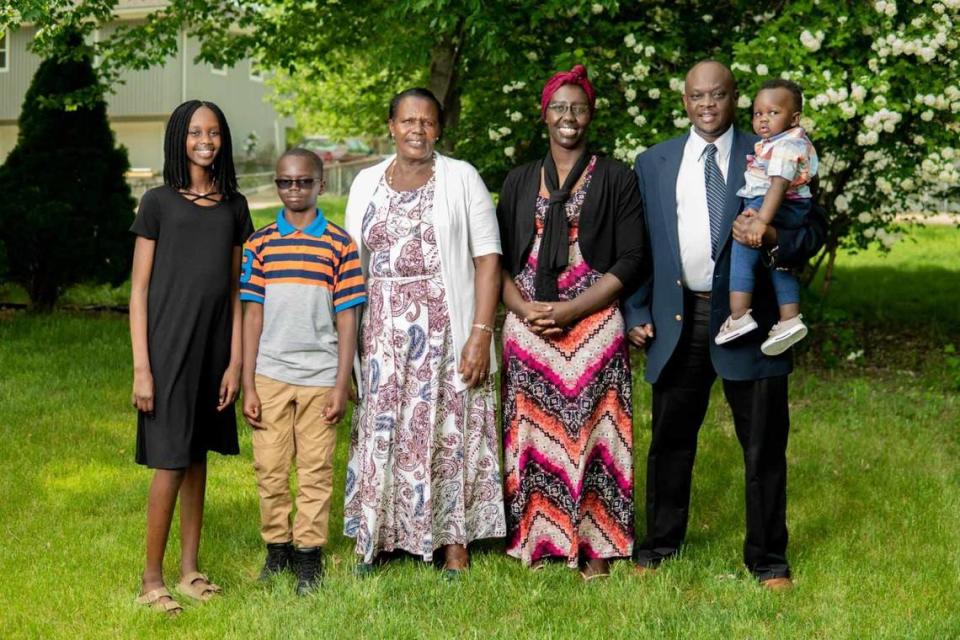‘A great loss’: Johnson County father crushed by van built KC community for Kenyans
Jacob Kiprop Birech was a Kenyan and a Kansas Citian.
The husband and father, who at one point ran for a seat in Kenya’s parliament, remained in Kansas City through the end of his life, building a community from the ground up.
Birech died earlier this month at the age of 53, after a vehicle he was working on in the driveway of his Johnson County home crushed him.
Birech and his wife of 20 years share three children in the U.S. and a daughter in Kenya.
Loved ones described Birech as a family man and a natural leader whose presence commanded a respect that often made him seem like the eldest in the room, even when he wasn’t.
“He was a student of life, and he was a very peaceful guy,” said Faith Langat, 49, of Overland Park, whose husband met Birech in Kenya before they all moved to the United States.
Birech left his mark on the Kansas City community.
“This is a great loss because it’s his footsteps that allowed us to really be a strong community,” Langat said.

Building a life in America
As a child, Birech, and his gaggle of eight siblings would often walk to Sunday school lessons held under a tree beside a river in their Kenyan village.
“He was a playful, disciplined, hardworking, outgoing and utterly ambitious student,” his obituary read.
Christopher Sang, now 50, grew up alongside his cousin, Birech, in a middle class, Christian household.
Sang and Birech stayed close through high school and college, and Sang watched as his cousin completed a bachelor’s degree in education before he was transferred to a poor, rural school for his first few years teaching. After that, Birech was asked to teach at a high school in Kenya, where he met a teaching intern who would later become his wife: Penina Jerotich Birech.
She played hard to get at first, Sang said, recalling how Birech rallied his friends to help win her over. It worked. She followed Birech to Missouri when he moved in 1998 to pursue a masters degree in leadership and public policy. They were married in 2003.
Once in America, Birech hustled, said Sang, who moved to the U.S. around the same time.
Sang watched as the Birechs created a family together, and he admired the intention his cousin put into fatherhood.
“His kids rave about him. Everywhere he went, he had his kids with him,” Sang said.
Birech took the youngsters everywhere: community events, church, the park, the lake, the basketball court.

He worked hard to afford the home they eventually purchased in Johnson County. Birech, who first made money by driving clients to the Kansas City airport, continued building a career in transportation logistics. He also worked as an accounts specialist for a local bank, and a Swahili translator for Kansas City Public Schools.
At the time of his death, he was finishing a PhD in public policy and administration at Walden University with dreams of pivoting his career into leadership.
But his children and his community were always his first priority, loved ones said.
Langat, a close friend of more than two decades, said Birech’s youngest son, who is 5, was like his wallet: he wouldn’t leave the house without him.
She called the patriarch strict but gentle, which she described as a “very African trait.” He loved to barbecue outside, and he’d bring his wife and daughter flowers... just because.
When his daughter Natalie had her prom earlier this spring, he came along to take photos, beaming with pride.
Natalie, who calls Langat her “auntie,” said she wanted to take her dad to a fancy Korean restaurant for father’s day as a thank you. Langat instead took her there soon after his death, to celebrate and remember him.
“I know daddy’s not here, but we’re going to do it,” she said.

Political aspirations
In 2007, after nearly a decade living in the United States, Birech and Langat’s husbands both decided to run for Parliament in Kenya.
The two wives moved in together, newborn babies in tow, as their husbands pursued political aspirations. They all leaned on one another for support, and Langat noted that no matter how late it was or how stressed they were on their long-distance calls, Birech’s voice was always calming.
The desire to run for office was born of Birech’s time in America, Langat said.
“You could hear the great knowledge that they carried with them that they wanted to share, “Langat said, recalling Birech and her husband saying: “When you go out to another country, come back and give back what you have learned.”
They became fairly prominent contenders. The current president of Kenya, William Ruto, (then a member of Parliament) even visited Birech and Langat’s husband in Kansas City for a luncheon.
But ultimately, they lost.
Langat said Kenyans found many of their ideas to be “fancy first-world theories that won’t work here.”
But she said they made an impact on political thinking in their homeland, nonetheless, reigniting conversations about topics like education, infrastructure, misappropriation of funds, women’s health, maternity and mental health.
“Even though they didn’t make it to win those positions, they just came back gentleman and ready to start where they had stopped,” she said.
Preserving a community
Around the same time the Birechs moved to the U.S. from Kenya, so did Elly Mwei.
In 2003, a small group of Kenyans met in an apartment in Kansas City. They wanted an organization that brought them together as a community and supported their growing families.
The Kalenjin Community in Kansas City, a subsection of the organization Kenyans in Kansas City, was soon born, and Birech was a founding member of the group, which represented the tribe he was raised in. (Kenyans in other U.S. cities have since modeled the same group. Eventually a national Kalenjin coalition was formed, and with Birech’s encouragement and leadership, Langat went on to become its first female president.)
“He built a community from the ground up,” Mwei said of Birech and the KCKC, which now numbers more than 350 members, not including children.
The KCKC is in the process of re-purposing a building near the Grandview Triangle to turn into a community center, which was one of Birech’s dreams.
He’d advocated for a cultural center where Kenyan American kids could learn who they are and exchange cultural stories.
It was a mission he’d had for awhile.
Birech was proud of his roots. His tribe is known for producing the best long distance runners in the world. So once in Kansas City, thousands of miles from home, he helped launch a community running group for the kids.
“We need to make our children realize the gift that is born with them,” Langat recalled Birech telling the other parents.
Together, they asked area schools if they could borrow their running tracks. They started “family fun runs” where Birech himself would hop on the track alongside the kids and show them the importance of running, even if he was never the fastest. Since then, some of the kids he helped teach to run have gone on to compete in the junior olympics, Langat said.
Birech’s daughter, Natalie, and son, Phillip, are runners for their school teams. Langat recently told Phillip about a video of a race where his father can be heard shouting encouragements off-camera.
“I told Phillip, every time he tries to slow down he should remember that voice of his father, encouraging him right in the background,” she said. “He might not be there, but you can hear his voice.”
Going home
Langat got a call from Birech’s sister-in-law on April 6. There had been a freak accident, she said.
Birech was in the driveway of his home on the border of Lenexa and Overland Park working on a van, which he used in his business, loved ones said.
“He had removed the wheels of his car and went under it to repair some damage but accidentally hit the jack causing the car to collapse and crush him underneath,” family friend Jennifer Wildung later wrote in a GoFundMe created to help cover funeral expenses.
Langat rushed to be by her best friend’s side.
By the time Langat arrived, there were already cars lining up for blocks offering support. That was weeks ago, and little has changed. Women have been in and out of the house preparing meals and cleaning. Men towed away the vehicle and power washed the driveway.
While, in the 25 years he lived in Kansas City, Birech came to adore the Chiefs and brag about local barbecue, Kenya would always be his first and last home.
On Monday, Birech’s family began their journey to his ancestral homeland with his body. He will be buried alongside his parents in Nandi County, where he grew up. A GoFundMe to help cover funeral costs collected about $5,600 in donations as of Monday morning.
Birech began building his legacy from the day he stepped foot in Kansas City, Mwei said.
Those who love him plan to make Birech’s many visions a reality. He already laid the foundation.
“His legacy is leadership,” Sang said. “He was unparalleled.”

